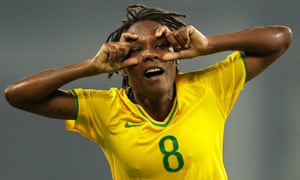Formiga forever: Brazil’s stalwart still shining for women’s football at 42 | Football
When England stepped out at Meadow Lane in October 2018, having qualified unbeaten for the Women’s World Cup, all eyes were on one opponent: Brazil’s six-times Ballon d’Or winner, Marta. Necks prepared to strain for a glimpse of the ageing giant of women’s football. It may have been a friendly but at 34 the Brazilian’s career clock was ticking. For most, it would be the only time to see her in the flesh.
When Marta limped off after 22 minutes the disappointment of the crowd was palpable. The Brazil performance matched Marta’s lacklustre mood but in the then 40-year-old Formiga they had a player who would not subscribe to her teammates’ indifference – with the young winger Ludmila the exception alongside her.
It was by no means a vintage Formiga performance, and as far from a Seleção classic as could be, yet it summed up her longevity. The Paris Saint-Germain midfielder, who on Thursday signed a new contract which will take her up to her seventh Olympic Games next summer and keep her at the top of European football into her 44th year, plays with abandon and a desire to progress the game every time she laces up her boots.
Unlike the one-word monikers of many Brazilian greats, Formiga is a nickname, not a shortened version of her name: Miraildes Maciel Mota. Triggered by her unselfish play and intensity, her teammates on the streets of Salvador called her the Portuguese word for ant, and it stuck.
She has played 77 games for PSG since joining in 2017 and won the Coupe de France, a freak storm helping the team deny Lyon the treble in 2018. Previously she spent almost all her career in the US and Brazilian leagues – a year in Sweden the outlier.
On the international stage she has left a mark in the record books. Formiga made her World Cup debut in 1995 as a 17-year-old, when Brazil beat Norway in the third-place play-off to earn bronze, and has become the only player to have appeared in seven World Cups – all but one of the Fifa-approved tournaments. Japan’s Homare Sawa made it to six. Germany’s Lothar Matthäus and Mexico’s Antonio Carbajal and Rafael Márquez each played in five men’s World Cups.
She might not have made it to seven. After the 2016 Rio Olympics Formiga announced her international retirement, only to be coaxed back by the manager, Vadão, to help the team through qualifying for France 2019. Even then she had no intention of playing at the tournament, but eight months before kick-off she told Fifa’s website: “Breaking barriers spurs me on.”
In the Group C opener against Jamaica she overtook Christie Pearce (Rampone) as the oldest player to compete at a Women’s World Cup at 41 years and 98 days. Of the 552 players in France, 150 weren’t born when Formiga made her Brazil debut.

You could argue that Formiga’s longevity at the top of Brazilian football is an indictment of the development of female players in the country, and Formiga would probably agree. In that game against Jamaica Cristiane Rozeira became, at 34, the oldest player to score a Women’s World Cup hat-trick. The talent is not coming through to force these legends to make way. Perhaps an inability to progress the domestic game in Brazil significantly and provide pathways to the top is part of the reason why the Seleção have failed to better finishing as World Cup runners-up in 2007.
The pioneers have rolled back the years time and again in an effort to force change. It prompted a passionate plea from Marta on their exit from last summer’s tournament. “There is not going to be a Formiga forever, a Marta forever, a Cristiane,” she said. “Women’s football is relying on you to survive. Think about it, value it more. Cry in the beginning to smile at the end.”
Although Formiga had not intended to play internationals beyond the Rio Games, her appetite has clearly been whetted for a little more, with PSG saying she aims to “to end her phenomenal international career in 2021 at the Tokyo Olympics”.
It will probably be their last push for the top and the end of an era, but not just yet.



